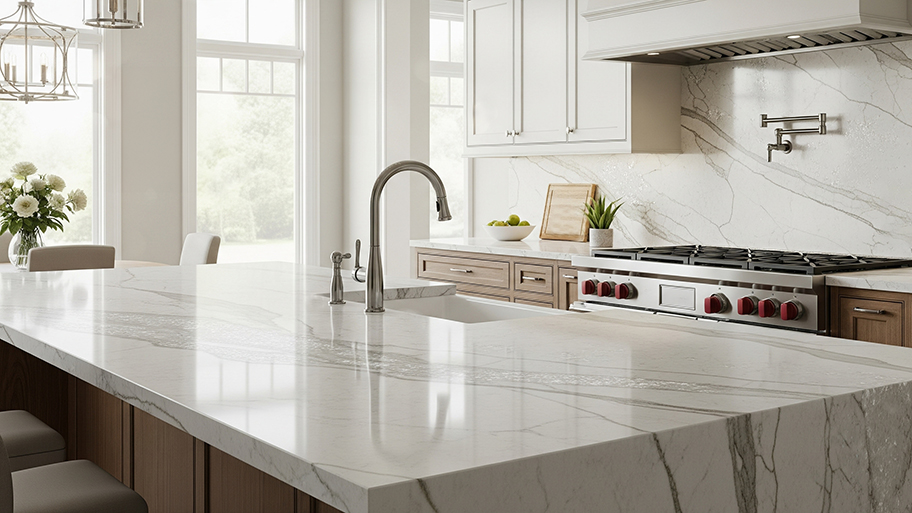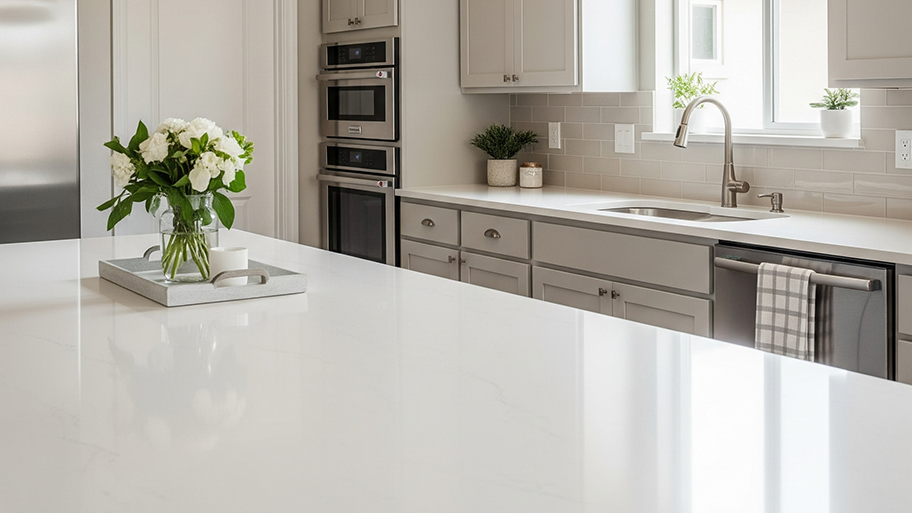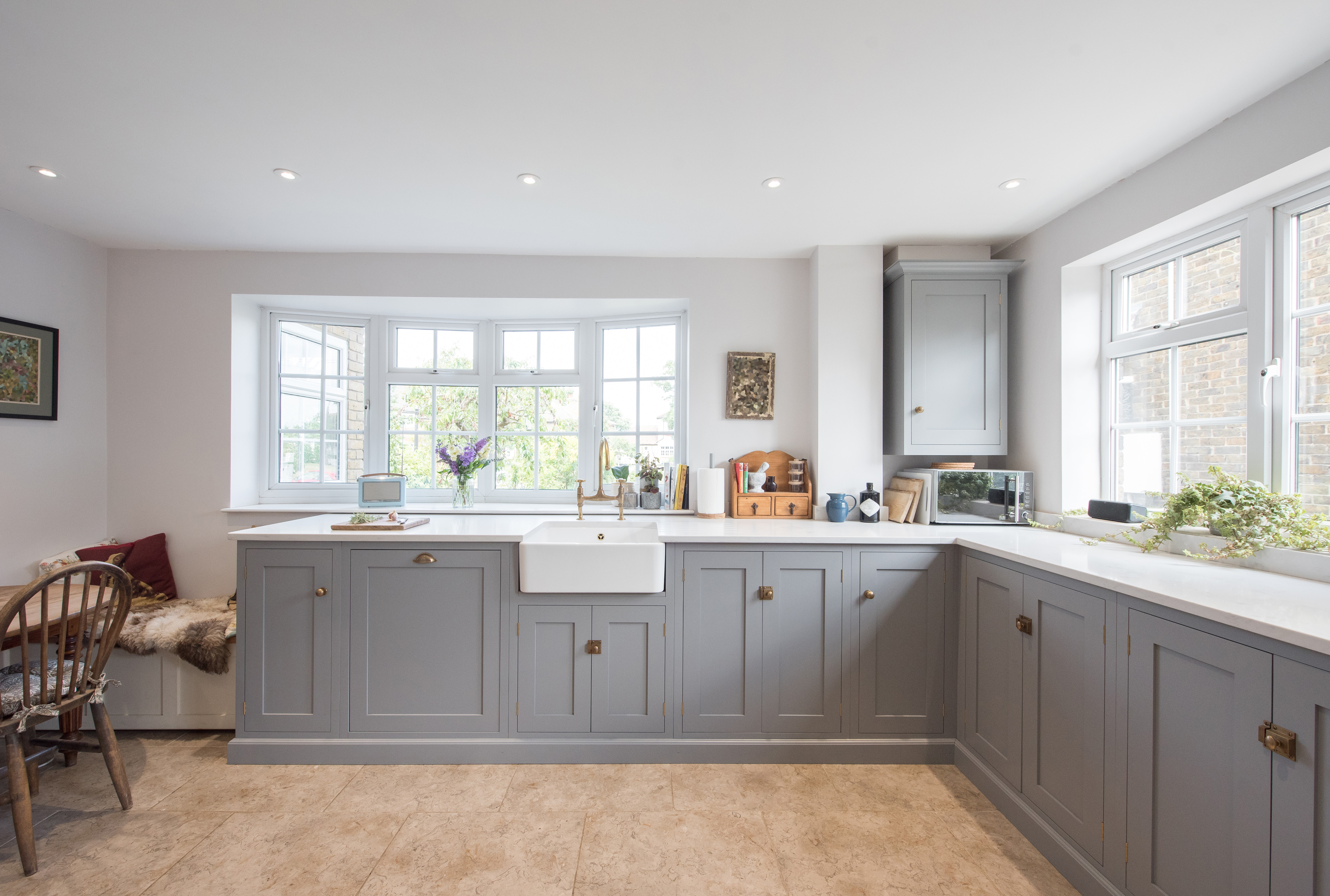
How much your quartzite countertops will cost depends on a number of factors—most prominently, the type of quartzite and the size of your counters.
This countertop material is solid as a rock—as long as you maintain it properly


Granite countertops are durable and unique but need regular sealing to prevent moisture damage.
This material has a long lifespan and is easy to repair, but installation is difficult and expensive.
On average, granite countertops cost $3,250 or $40 to $100 per square foot.
There are many alternatives to granite if you’re not sure this countertop material is for you.
Kitchen countertops see a lot of action, from chopping and prepping for dinner to food and drink spills. Therefore, your countertops need to be tough and durable while looking good with your kitchen design. Granite is a popular material, but what are the pros and cons of granite countertops? This guide will explore the ins and outs of this material to help you decide whether granite is the right choice for your space.
Granite is a type of igneous rock that forms naturally over time as magma cools and solidifies. It’s mainly composed of quartz, feldspar, and mica, and every slab has a slightly different makeup. As a result, each slab is unique, which makes granite an ideal countertop material if you want your kitchen design to stand out.
Because it’s solid stone, granite is a highly durable material. However, like any type of countertop, there are pros and cons to consider.
| Granite Countertop Pros | Granite Countertop Cons |
|---|---|
| Highly durable | Requires regular sealing |
| Variety of designs | Expensive |
| Easy to repair | Difficult to install |
| Low maintenance | Naturally cold |
| Increased home value | May have visible seams |
| Long lifespan |
There are many benefits of granite countertops for homeowners who want a sturdy and beautiful material for cooking and socializing, including durability, variety, and low maintenance requirements.
One of the biggest benefits of granite is its durability. Granite is a natural stone, which means it’s incredibly hard and will last for decades. It’s nearly impossible to scratch, chip, or dent granite, and you can even set a scalding hot pan directly on the surface without causing a mark. This durability makes granite an excellent choice for a home with rambunctious children (or adults).

Granite is available in various colors and designs, so you can easily find one to match your kitchen style. Popular granite kitchen countertop colors include white, blue, gray, black, brown, red, and green. Designs can also include veining, flecks, and speckles of color to add visual interest. Every granite slab is unique, so you can be sure no one will have a kitchen quite like yours.
Granite is incredibly durable, but it’s easy to repair a crack or chip by filling it with epoxy. It’s best to leave granite repair to a professional—but before you call, check to see whether your countertop warranty covers the repair.
Granite is also very easy to keep clean and maintain. Wipe your countertops often with soapy water or a gentle cleaning solution and a soft cloth. You can even get cleaners specifically made for granite. The material naturally resists bacteria and dirt, so there’s no need to scrub to get your countertops spotless.
Your kitchen is a main focal point in your home and can directly impact its value. Installing granite countertops can make your home more appealing to potential buyers. Even if you don’t plan to sell your home anytime soon, it’s good to know that your kitchen would be buyer-ready if you did need to sell.
With proper maintenance and regular sealing, granite countertops can last a lifetime. Even neglected granite countertops can be restored by polishing and sealing them using products available at home improvement stores.
Some kitchen countertops are better suited for specific households. For example, if you have children and frequent spills happen, choose a nonporous material like quartz. A countertop installer can help you decide how durable the counter needs to be for your kitchen.

Though the list of advantages of granite countertops is extensive, there are also a few disadvantages to consider.
Because granite is naturally porous, it must be sealed to prevent damage from liquid spills. Some granite countertops come pre-sealed, while others must be sealed once installed. Depending on the sealant you use, you may need to reapply it every one to three years.
Granite countertops cost between $2,000 and $4,000 to install, with an average cost of $3,250. That price tag is relatively high compared to other materials, like laminate, quartz, and solid surface. While it’s possible to buy granite countertops for as little as $10 per square foot, cheap granite may not be the best quality and might not last as long as a more expensive option.
Granite is a solid stone countertop, which means it’s heavy and bulky—and, therefore, hard to install. Unless you have professional tools and equipment (not to mention experience), you should leave the installation to a local granite countertop pro. This will also increase the installation price.
Granite is naturally cold, which can be a disadvantage during the winter (or all year long if you live in a cold climate). Granite might not be the best option if you want to lean comfortably on your countertops.
Depending on the size of your kitchen, you may need several slabs of granite to make one complete countertop. Joining slabs together can leave visible seams, but your installation pro will join them using color-matching epoxy to disguise them.

Granite isn’t the only durable and long-lasting countertop material out there. Consider the following alternatives to granite countertops before making your decision:
Marble
Quartz
Quartzite
Soapstone
Concrete
Tile
Recycled glass
Solid surface (such as Corian)
Laminate
Butcher block
Stainless steel
Granite countertops are a stylish addition to any kitchen, and since they come in various colors and styles, it’s easy to find the right granite slab to match your kitchen design. Granite is durable and will hold up for many years, though it does require frequent sealing to prevent it from sustaining water damage. If you want a low-maintenance countertop that suits your aesthetic, granite could be the perfect choice.
From average costs to expert advice, get all the answers you need to get your job done.

How much your quartzite countertops will cost depends on a number of factors—most prominently, the type of quartzite and the size of your counters.

The cost of soapstone countertops varies primarily based on the size of the installation area, the color of the stone, and the type of edging.

Silestone® has long been a favorite of homeowners who like the look of quartz. Budget for your Silestone® countertop’s cost with this helpful guide.

When fabricators cut a slab, they leave leftover pieces sold as granite remnants. Granite remnants can be perfect for small countertops and save you money.

If you’re considering floor materials, weigh the pros and cons of limestone flooring before making your final choice.

If you’re considering a kitchen remodel, you may wonder, what are quartz countertops? Learn everything you need to know to make a decision here.